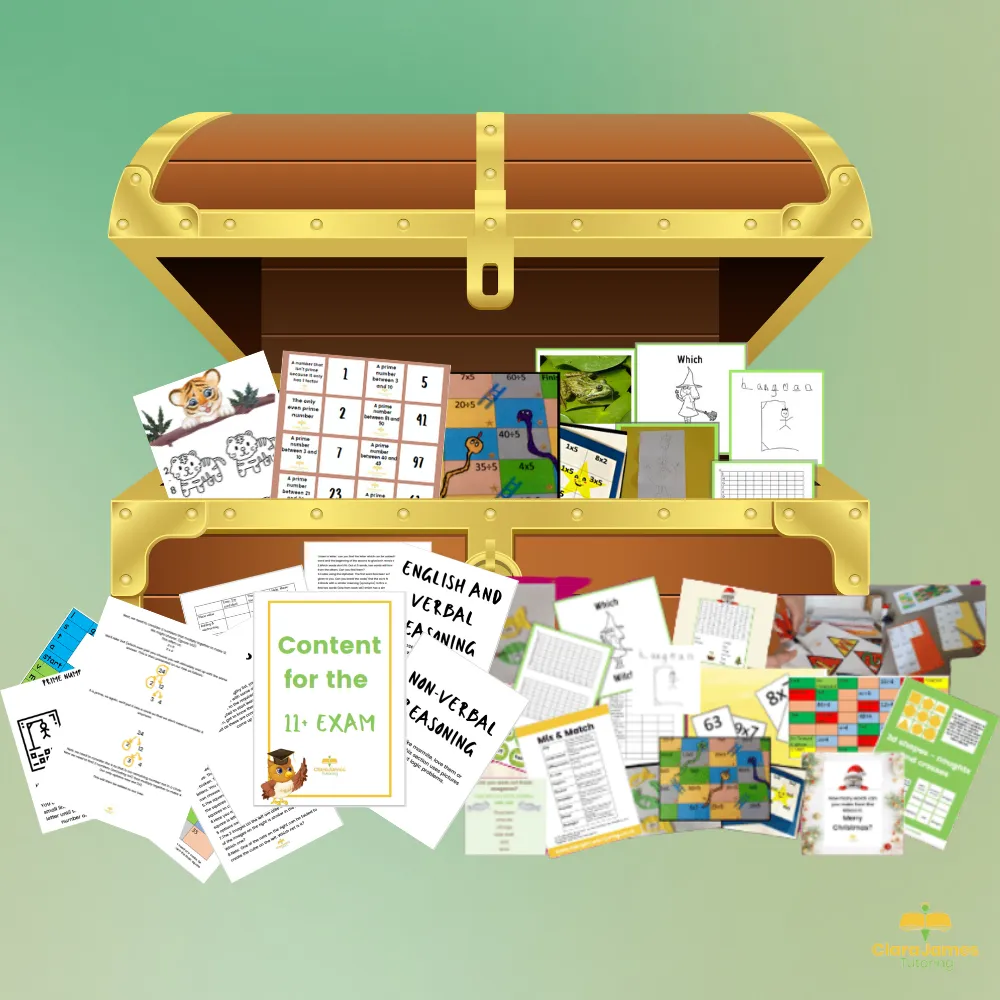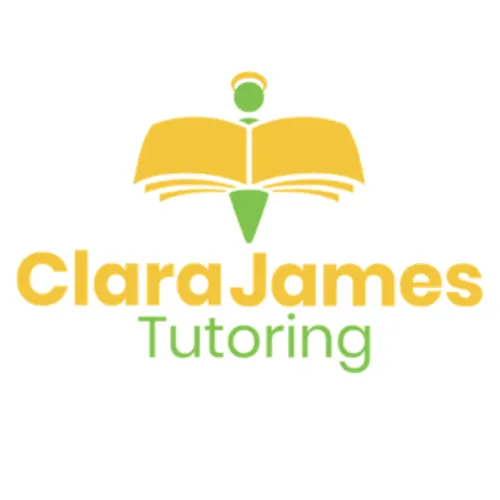Clara James Tutoring
BLOG POSTS

Using games to support a child's learning
Why Games Are a Powerful Tool in Learning
“I think it’s time to do some proper learning now.”
A phrase put to me by a mum a few years ago. Here daughter was ADHD and struggling to concentrate at school. We had worked together for a couple of months, and she had made great progress during that time.
This is my justification for using games and not always relying on the conventional methods of text books and worksheets that are so often relied upon in many educational settings:
I hand your child a work sheet, they diligently work through it. I correct any mistakes and pass them another one to help consolidate the information. Again, they work through it completing it to the best of their abilities.
A day or two later their teacher asks them a question relating back to that worksheet. Their brain desperately searches inside their head for the place where they stored that information created by the worksheet, but much to their dismay it remains elusive. To their embarrassment, after all that hard work, they must admit they don’t know…
However, if I had approached the same task from a different angle, there is a high probability the result might have been different.
Let’s imagine we are working on solving simultaneous equations, we can start by drawing a bright colourful set instructions on how to solve them.
Next, we might tackle a codebreaker together, using the answers to the questions to reveal a letter which in turn reveals a joke.
A pairs game might be next, the goal to match a corresponding question and answer.
Finally, we might have a look at some exam style questions.
By taking this approach we are helping them to create multiple memories so now when the teacher asks them to answer a question their brain has more places it can go to where it can grab the information that it needs.
I used simultaneous equations here, but I could just have easily used times tables:
a pairs game, a game of Jenga with a number written on each brick which needs to be multiplied by our times table of choice, a game of bingo, or snakes and ladders, each with questions associated with that particular times table.
In English we might play 4-in-a-row, funny pictures, or adaptations of the games mentioned previously.
What is more, when we are playing games, we are hopefully enjoying ourselves. When we enjoy ourselves, we relax. The more relaxed we are the better frame of mind we are in to retain the information we are given.
What is more, games can be repeated time and time again reinforcing the information, whereas the repetition of a worksheet may not have the same appeal to most people.
By incorporating games into learning, we're not just teaching the subject matter—we're engaging your child in a way that makes the material memorable and enjoyable. The repetitive nature of worksheets can often feel tedious and uninspiring, especially for young learners. However, when the same concepts are woven into a game, your child is not only more likely to engage with the material, but also to internalise it more effectively.
Games encourage active participation, critical thinking, and problem-solving, all within a context that feels less like work and more like play. This approach doesn’t just build knowledge; it builds confidence. When your child enjoys the process of learning, they're more likely to carry that positive attitude into the classroom and beyond. They’ll approach challenges with a mindset that says, "I can do this," rather than with the anxiety that often accompanies traditional methods.
So, please remember that the games we play are not just about fun—they’re powerful tools that help your child learn in a way that’s both effective and enjoyable. After all, when learning feels like fun, the knowledge gained is not only retained but cherished.

Our goal at Clara James Tutoring is to make learning fun and accessible to everyone. If children are engaged in what they are doing they are more likely to want to participate, if they are enjoying it, they are more likely to relax and retain the information.
If they are retaining the information it will help boost their knowledge and with knowledge comes confidence.
If you have a child who enjoys learning through games and being more creative, and you enjoy spending time with them, you might be interested in the Clara James Approach, the membership group we have put together to support you in supporting your primary school aged child with their maths and English.
Interested?
Click here to learn more: The Clara James Approach
Happy New Year - Jan 2024
Happy new year!
I hope you’ve had a brilliant break over Christmas.
I know some people have been on holiday, others have been enjoying family time at home. Either way, I hope it was fantastic.
Someone sent me a Christmas present just before the bog day, but I have no idea who it was from, so I can’t say thank you. I feel really guilty as it seems like bad manners, but it was just in a box from M&S with no message attached.
This year, I have committed to send out the notification when the monthly membership bundle goes live, but I am also going to send out an (initially) fortnightly newsletter with suggestions for revision / secondary school Math / English, then in the alternate week a newsletter with suggestions for the primary subjects.
If either of them isn’t relevant, please either let me know and I will ensure you just get the primary or secondary newsletter if you want it, or just click unsubscribe (but then you also won’t receive the email about when the bundle goes live).
My goal is to keep you more in the loop as to what is happening. For example, we occasionally put free courses on Udemy – we’ve just done one on angles – here’s the link if wanted. It was created to promote the topic book we have also created; we’ve also got revision planners for students that might be suitable for some GCSE parents.
At Christmas we also had some free times-tables colouring sheets which you may not have been aware of, so like I say, it may not be of interest to you, but if it is, at least you’ll be aware of it. I have 3 revision planners and 3 angles topic books to give away if you’re interested. Let me know and I’ll happily pop one in the post for you (or give it to you if I’m likely to see you…).
If you do have one, if you could give it feedback on Amazon (I’ll send you the link) that would be hugely appreciated.
Happy new year for now and warm wishes,
Dawn
Times Tables - Jan 24
Hi,
Last week I sent out an email saying I was going to try and commit to sending out an email at the beginning of each week on ideas to support primary school children, then later in the week about supporting secondary school children.
As a result, I was asked if I could also send out some ideas to support the 11+.
(Again, if this doesn’t concern you let me know and I’ll try to ensure that you don’t receive them).
I’ll send the 11+ emails on an alternate Wednesday as I normally have Alfie, my grandson on a Tuesday and the odds of getting much done with a lively 2-year-old for company…
There will be some cross over between primary school and secondary school subjects, but at any stage there is something you specifically want me to help with, please do shout.
So, back on subject, sorry…
Times tables have always been one of the key subjects that I work on with, specifically primary aged children, but also secondary school children, and often the parents say they’re awful at them as well…
I don’t suggest learning them in chronological order.
If you do, you’ll hit some of the much harder ones before you get to some of the easier ones.
Instead, what I suggest (and you’ve probably heard me say this before) is that you start with the 10’s, 11’s, 2’s and 5’s as they do in school.
Then deviate across to the 9’s as there are so many tricks to help you to learn them.
Then the 6’s or 7’s. Crazy I know! But they are quite simple if you split them so that 6x8 becomes: 5x8 + 1x8 = 50+8 Or 7x8 becomes 5x8 + 2x8 = 40 +16 = 56.
From there you can pretty much work in any order.
The 12’s is also straight forward as we can split it into 10x + 2x which would give us the same answer as 12x.
There are more suggestions on the times tables over in the Clara James Approach, or I have a sequence of emails which sends out once a month with suggestions on how to learn each of the times tables with some resources. If it would help, the link is here: Support your child with their times tables - The fun way! (sendfox.com)
I hope that’s helpful and not just waffle.
Like I say if there is anything specific you would like us to focus on, please do give me a shout.
Have a great week and warm wishes,
Dawn
Hand Writing Support
Hi,
I hope you had a good weekend.
Something I am often asked about is supporting hand-writing skills.
At a young age this may relate to the hand muscles in the hands not yet being fully developed and I have a few suggestions that may help.
As the child gets older, you may want to find the support of an occupational therapist to provide some suggestions.
1. Start big: I guess it’s a bit like parking a car. When you are first asked to park a car, you wouldn’t want to park in a narrow gap, you’d hopefully save that until you were more confident, more skilled. Handwriting practice is the same, using a big piece of paper is far better than trying to squeeze your imperfect shapes between two narrow lines. Even better, (if the weather is more forgiving) start by using water to paint on the side of the house, a patio or footpath). Use large movements and as these improve start to shrink it down to what is expected inside a school exercise book.
2. Jenga: I love this game and we’ve adapted it by writing numbers of the bricks so that we can practice number bonds or the times tables, we’ve also got grammatical terms on others so that we can also practice those. But the skill and care needed to remove the brick from the tower without it all tumbling is a great way to practice the fine motor skills which will in turn support handwriting.
3. Colouring is another suggestion: keeping the colouring inside the lines is another skill that requires practice and patience. Again, the strokes used in colouring can further aid the shapes created when writing letters.
4. Sewing again requires the use of the fine motor skills needed for neat handwriting. You may just do a normal running stitch on a square of fabric, or you may decide to make something or use a more elaborate stitch. Either way I hope this helps.
5. Playdough and clay are other great early interventions to building up the muscles in the hands. The stronger and more developed the muscles are the more precise we can be with our writing.
To be honest, anything that needs to be precise will help. Many crafts and building activities help.
For some people, messy handwriting is always an issue.
There are a couple of members of my family whose handwriting I always struggle to read, yet they are so intelligent. It doesn't seem to add up. But my daughter says, if she doesn’t write quickly, she can’t remember everything her brain is throwing at her. Her brain works at such a speed.
I used to tutor a girl a couple of years back. I hadn’t realized her mum was an invigilator for the A’ levels at the school my youngest went to.
Not long after Hay sat her history the mum asked me if my daughter was doing her exams now.
Yes.
Does she do History?
Yes. Is she called Angel?
Yes.
She said, I thought it must be your daughter.
I have never seen anyone writing so quickly. I expected sparks to come off that page!
There are many reasons why people have scruffy handwriting, sometimes it needs to be investigated and like I say, if you are worried about it, it might be worth while trying to get in touch with an occupational therapist.
Sometimes, practicing using the suggestions above will help. Sometimes, like with Hay, it’s just one of those things that make them, them.
I hope this has helped a bit.
Have a great week and warm wishes,
Dawn

